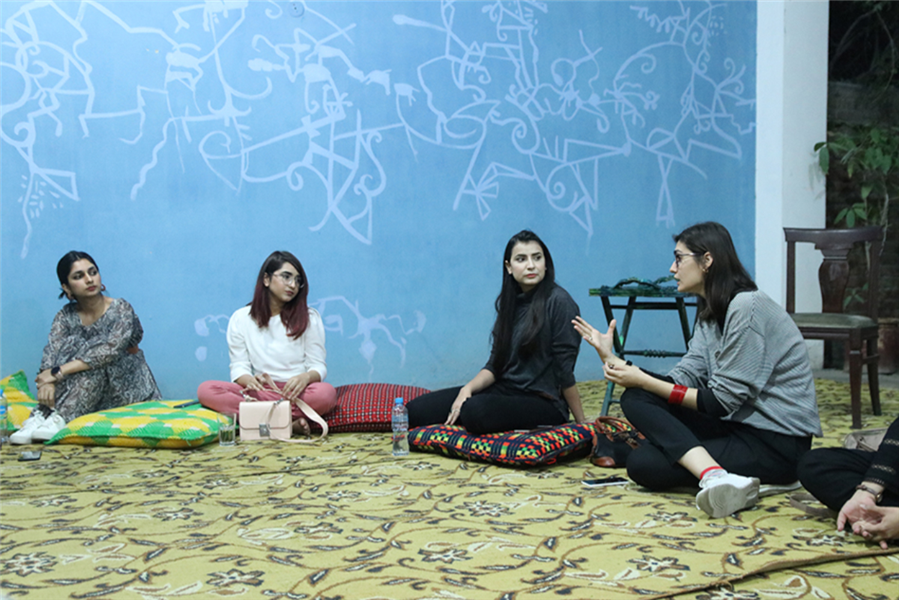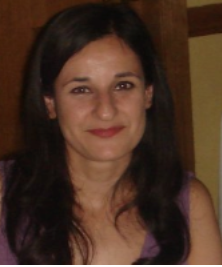- Home
- News
- Transforming Narratives’ Cultural Leadership Programme: A Q&A with Dr Samina Zahir
Transforming Narratives’ Cultural Leadership Programme: A Q&A with Dr Samina Zahir
17 January 2022

Main image courtesy of GRAIN Projects commissioned as part of Transforming Narratives Digital Collaboration programme
The Cultural Leadership Programme, a significant element of Transforming Narratives, concluded at the end of 2021. The programme invited 24 participants from Birmingham, Bangladesh and Pakistan to enhance their leadership skills in the sector.
It forms a crucial part of Transforming Narratives’ ground-breaking project to create tangible, meaningful artistic productions, partnerships and dialogue between the three countries but also produce a legacy of practitioners to carry this forward.
Through the Cultural Leadership Programme, the participants are now better equipped to expand their own creative work, organise and lead projects that will benefit and inspire their communities as well capture financial resources and support.
Some of the participants have also submitted expressions of interest to contribute to the Transforming Narratives Mela and Symposium, which will be a free online festival taking place from 19-21 March 2022.
Here Dr Samina Zahir (FRSA), of Hybrid Consulting, who led the latter stages of the programme, talks to us about the dynamic activities involved and their positive outcomes.

Dr Samina Zahir
What was your role within the Transforming Narratives Cultural Leadership Programme (CLP) and what did it involve?
I was a Programmer and Facilitator of the Cultural Leadership Programme (CLP). Working with the British Council and Transforming Narratives, I identified a small number of themes that resonated with the Transforming Narratives programme – as well as the challenges of our contemporary world such as:
- Local Contexts
- The Culture of Leadership
- International Collaboration
- Strategies for Future Planning
We also had sessions on project planning and fundraising – encouraging participants to think through the content of applications and support project planning, delivery and engagement.
I then structured the programme and produced our learning outcomes. Once these were in place, I identified the speakers we wanted to work with.
The CLP participants were spread across Bangladesh, Pakistan and Birmingham in the UK and there were two cohorts – emerging and established leaders – so we were mindful of this when programming.
As internet access wasn’t always guaranteed, or stable, we recorded sessions so participants could view them later (or view them again), with aural, video and transcripts available to download.
We also asked speakers to provide us with a short biography and some background information on the key points they were going to make in advance so that participants could reflect upon their learning prior to the presentations. The scope to ‘pre-prepare’ is an important feature when teaching and learning is online.
What activities did the participants undertake?
Due to its digital nature, we broke the schedule down into much smaller pieces than we would have ‘live’.
Each session started with an interview between two people who explored that session’s theme. We appreciated, for example, insights into large organisations’ artistic policies, development agencies pivoting during the pandemic and artists leading place making explorations with community participation.
We also had masterclass presentations from digital trails to Tate Modern’s Turbine Hall takeovers and the delivery of international cross-cultural programmes.
We had presenters who are collaborating on specific projects, art form-led/artist-led practices and founders discussing their career journeys and strategic/organisational-led insights.
Artists, such as Salima Hashmi (Pakistan), Naiza Khan (Pakistan & UK), Natasha Noorani (Pakistan), Samar Zia (Pakistan & UK) and Sofia Karim (Bangladesh & UK).
Organisations we collaborated with include:
- Artciti Gallery (Pakistan)
- Arts Council England (UK)
- Birmingham Museums Trust (UK)
- British Council
- Centre for Communication and Development (Bangladesh)
- Chinaplate (UK)
- Civic Square (UK)
- Culture Central (UK)
- Foundation for Arts, Culture & Education (Pakistan)
- Institute of Informatics and Development (Bangladesh)
- Legacy WM (UK)
- MAC (UK)
- Nahid Siddiqui Foundation (Pakistan & UK)
- Saffron Music (UK)
What was the subject matter and topics the participants were taught?
At its heart, the programme is about international collaboration, so we wanted the participants to develop their understanding of how international collaborations happen; to learn more about the art landscape in each country and apply this learning to grow partnerships and networks across Bangladesh, Pakistan and the UK.
This was the breakdown:
- Local Context
Participants increased their understanding of how arts activity operates in local contexts across Bangladesh, Pakistan and the UK. An increased understanding of geographic and cultural contexts will support community participation. Learning new ways to work, hearing fresh ideas and thinking about spaces and communities will help to deliver collaboration.
- The Culture of Leadership
Participants learnt more about themselves, to further uncover their own voice and leadership style. They increased their understanding of how creative leadership is committed to maintaining highly collaborative learning spaces so that all can thrive and that leadership isn’t just about leading from the ‘top’ but about creating and holding safe spaces.
- International Collaboration
We built confidence in developing international partnerships so the participants would have an enhanced understanding of the potential of international collaboration and the value it brings as well as the type of communication channels and collaborative partnerships they might use.
- Strategies for Future Planning
Understanding more about how Development Agencies, Organisations and Leaders have responded to the impact of the pandemic and how, in turn, they might develop effective fundraising strategies to raise funds from institutions, government and individual donors.
They now have a better understanding about how strategy can help to shape decision making and in turn enable longer-term growth.
How will these activities and lessons prepare and/or improve their cultural leadership skills?
I hope that the participants will have extended their networks and increased their understanding of international collaborations.
I also hope that the participants will start to apply some of the principles of leadership they’re learning and use these to lead international collaborations. They might explore and develop creative ideas for projects and generate international connections through the programme both as part of the Transforming Narratives programme and festival and hopefully beyond this opportunity.
← Read other news articles